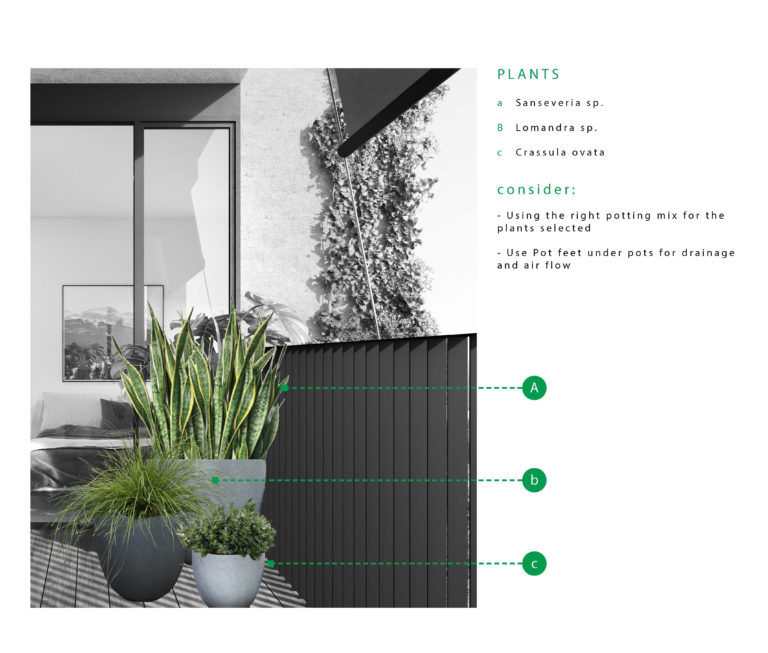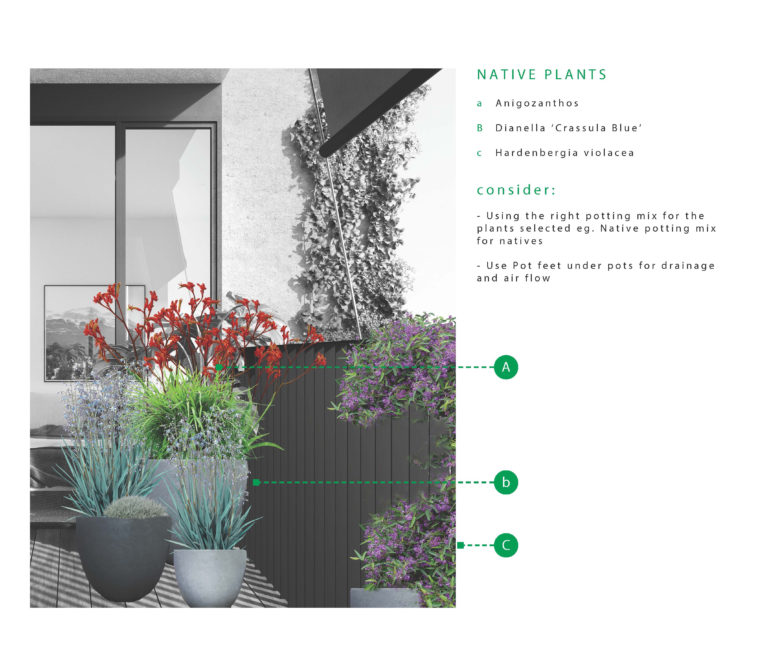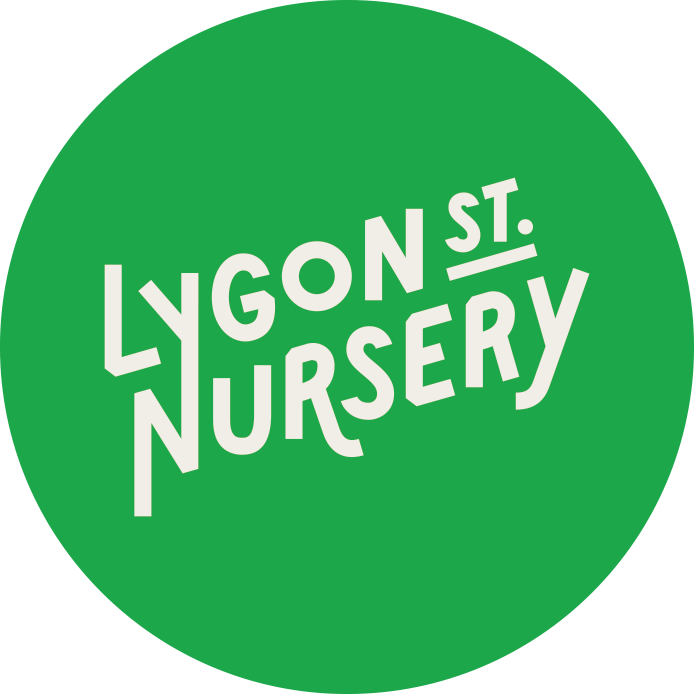BALCONY GARDENS
A balcony is a unique environment different to a typical garden at ground level. The environmental conditions are very different. Wind and more extreme heat can have an impact on plants on a balcony. Plants survival will also depend on how many light hours they receive in a day. Before deciding what plants will be suitable for a balcony, it is important to understand 4 key elements.
4 KEY CONSIDERATIONS
Aspect– which direction is the balcony facing and how many hours of sunlight.
Availability of water –how practical will it be to water and how often?
Drainage – plants in pots should drain freely.
Weight limitations –as a minimum the Australian Standard for a balcony is 200kg per sq.m so it essential to use lightweight pots with lightweight potting mixes.
PLANT SELECTION
A balcony can be a harsh environment with exposure to wind and very little shelter so it’s important to choose plants that are robust and can tolerate drying out and wind exposure. Your plant selection should also be based on what light condition they are going into
- South facing – shade tolerant species
- East Facing – plants tolerant of sun/part shade
- North Facing – plants tolerant of sun
- West Facing – plants tolerant of harsh sun
PLANTS FOR DIFFERENT ENVIRONMENTS
We suggest selecting plants that will tolerate the conditions and survive without excessive watering and fertilising. Selecting the most suitable potting mix for the plants will also help to improve the long term chances of survival. We can also companion plant in order to help other plants on the balcony survive. For example, planting a species tolerant of wind will help shelter other plants on the balcony and improve the chances of survival.
POT SELECTION
Lygon St Nursery sells a number of lightweight fibreglass and polyfibre stone pots suitable for use on balconies and rooftops. The Smartline, Balcony Lite, Terrazzo Lite and Topline all come in dark and light greys in both smooth and textured finishes.
Ceramic pots are also suitable as long as they are smaller or weigh less than 60-70kg.
Importantly, all pots should be placed on pot feet to improve airflow and drainage.
Our top 10 suggestions for balcony gardens
Brachychiton rupestris
Laurus nobilis ‘Flavour Master’
Cycas revoluta
Correa cultivars
Crassula ovata
Olea europea (Olive)
Citrus (Lemon, Lime Mandarin)
Adenanthos sericeus 'dwarf'
Sansevieria trifasciata
Lomandra cultivars


Green talk WITH MICHAEL Khalil
What I've learnt about: Balcony gardens
Michael has personally answered these common questions about Balcony Gardens.
Question:
How do I know if a plant will survive on my balcony?
Answer:
Plants that are adapted to surviving extreme conditions are more likely to survive on a balcony. For example, plants that are tolerant of wind, drying out and drought are better able to adapt to the harsh conditions on a balcony. Many Australian native plants such as Adenanthos sericeus (Woolly Bush), Lomandra sp. and Correa sp. can tolerate wind and periods of drying out. Watering these plants will still be essential, however these species are better adapted to recover if they experience extreme temperatures.
Question:
What herbs and vegetables can I grow on a balcony?
Answer:
erennial herbs such as Rosemary will do well on a balcony provided they get plenty of sun. Other herbs can be grown in small containers as long as they receive regular water and can be protected from wind and extreme temperatures.
- Warrigal greens
- Tomatoes (Vine best)
- Mints
- Brahmi
- Lemon Verbena
Question:
What are some good small screening options on a Balcony?
Answer:
Laurus nobilis ‘Flavour Master’ or ‘Baby Bay’ are both excellent examples of screening/hedging plants that can provide a privacy screen on a balcony and cope well with the extreme conditions. The good thing is, they can also be used in cooking. They look great planted with Rosemary.
Citrus and Olive trees and Adenanthos sericeus (Woolly Bush) can also be planted to provide a privacy screen.
Question:
How often should I water the plants on a Balcony?
Answer:
There is no single answer for this question because every plant is as different as are the conditions they grow in. The key is to regularly check and monitor any changes to the plants. If you notice things like yellow or brown leaves, black or white spots or bugs, take a photo and we can help you to figure out what could be causing the plant distress. Note: it’s always best to water early morning and late evening to prevent any burn and make sure that you use pot feet to help your plants properly drain.
Question:
What soil should I use on a Balcony and how often should I fertilise?
Answer:
In order to give the plant the best chance for survival, a good quality potting mix should be selected to suit the plant (always look for the sign on the soil bag that it is an accredited product). For example a citrus tree should be potted in a good quality citrus mix which will have the right balance of fertilisers specific for the plant.
Natives will thrive in a native potting mix which is low in phosphorus, while many other plants will be suitable in a general, premium potting mix. Our range of potting mixes come from Grow Better, a reputable and environmentally sound local Australian supplier.
Given that all plants on a balcony grow in pots, it’s important to add dried pellet fertiliser over Autumn/Winter or a slow release feriliser suitable for the plants every 4-6 months. In addition, consider consider using liquid fertilisers such as Seasol and Powderfeed over Spring/Summer.
If you notice any signs of pest and disease, take a photo and bring it in store and we can help you identify it.
Question:
What is your top plant pick for a Balcony and why?
Answer:
Brachychiton rupustris would be my favourite at the moment. It stores water in its trunk and it can withstand being potted up for long periods like a bonsai.


